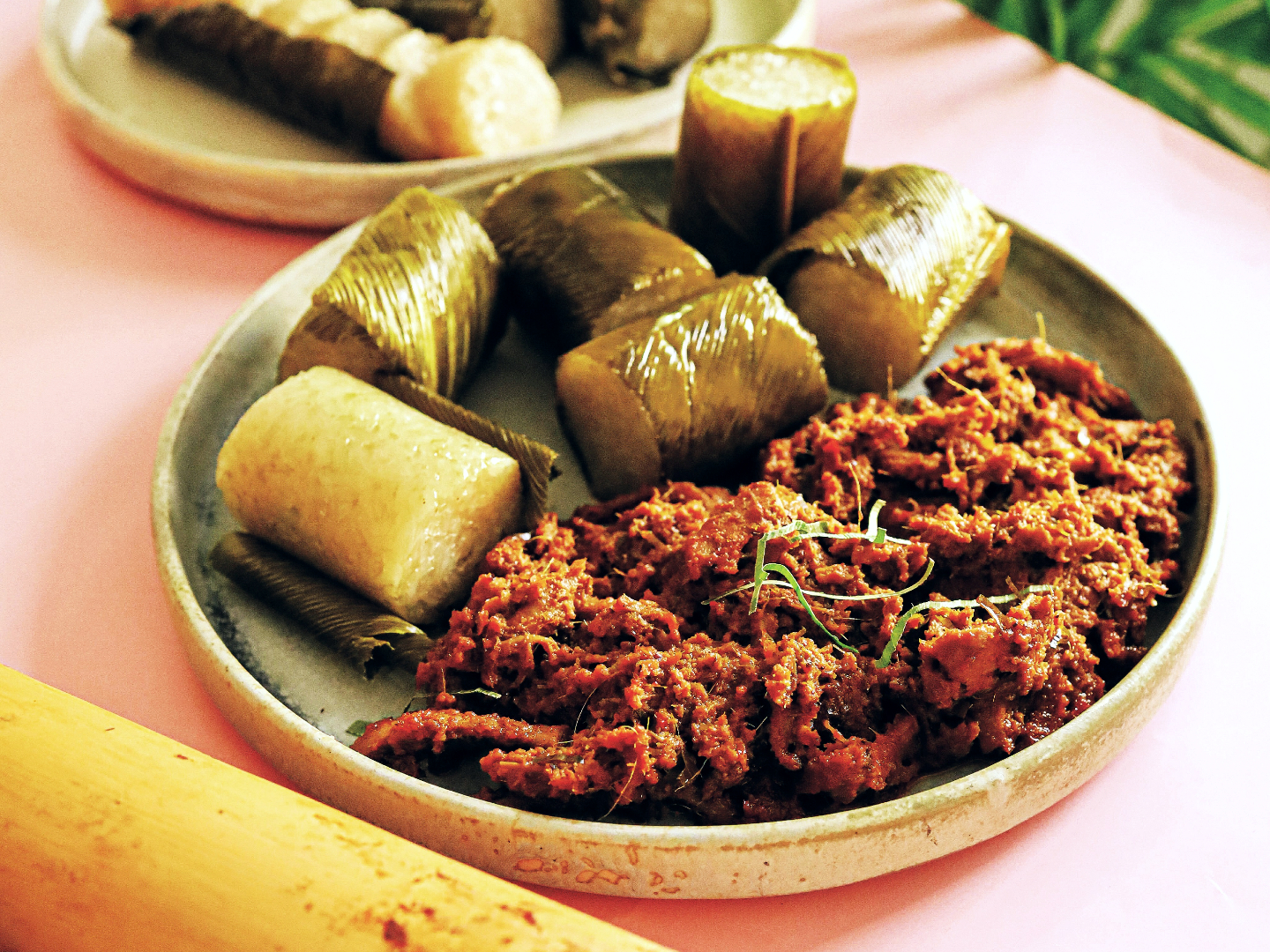
Lemang and vegan rendang by Mushroom Lah (Photo: Mushroom Lah)
Considering that the words ‘vegan’ and ‘vegetarian’ do not even exist in Bahasa Malaysia, the number of Malay food businesses catering to this niche is impressive. Options looks at three entrepreneurs in the vegan Malay food space — coincidentally, they all sell the festive staple of rendang — to find out how they developed a taste for meat-free meals, about the consumers who hunger for this and what the future looks like for the growing F&B segment.
Dominion is a 2018 documentary that exposes the dark underbelly of modern animal agriculture. While focusing mainly on animals used for food, it also explores other ways in which creatures are exploited and abused by humans, including in the areas of clothing, entertainment and research.
“It changed my life,” Hanna Hassan says. “There was no way I could go back to eating meat after watching that.” Upon embarking on a plant-based diet, however, Hanna realised how few options there were for those turning away from animal-based protein. That realisation dawned on her during a Movement Control Order last year, when the majority of Malaysians were working from home and eager to catch a break from cooking their own meals. Hanna went into entrepreneurship and launched Foodbae, a food delivery service catering to a very specific, yet underserved, niche: local vegan food.
“I was making food I wanted to eat, essentially, or dishes I loved and couldn’t find vegan versions of,” she says. “We did provide a few Western food options, but our customers were more interested in the Asian dishes, I believe because you can easily find meat-free meals in Western cuisine. Asian food, not so much — and Malay food, even less.”
20220324_peo_hanna_hassan_pg-19.jpg
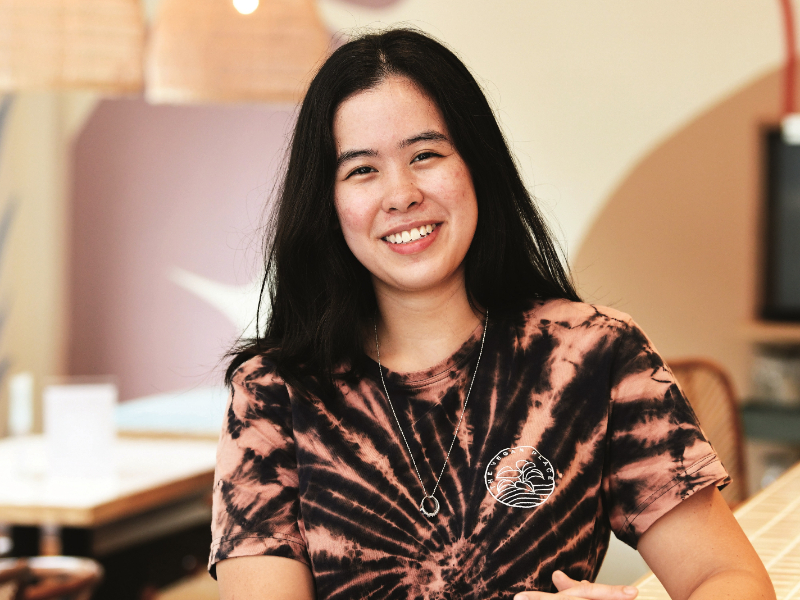
The many challenges of working with external delivery partners were discouraging and ate into the business’ bottom line, so Hanna set her sights on a new goal: a restaurant. When a customer signed on as a partner, she had the funds to convert vision into reality and opened The Vegan Place in Desa Sri Hartamas, Kuala Lumpur, two weeks ago.
The menu at The Vegan Place is based on the winning dishes of Foodbae — Nasi Campur Combo, Mushroom Masak Lemak Cili Api, Mushroom Masak Kicap and Sambal Terung, and, of course, Nasi Lemak Rendang. To cater for children or those unable to take the heat from traditional Malay fare, Hanna has added Western-style dishes such as spaghetti and burgers.
Mushrooms of various kinds provide the fleshy texture of meat, while tempeh and soya chunks are a good source of protein. “We don’t use the gluten-heavy faux meat products, and we don’t think we will use the mainstream plant-based meat products either — we try to have whole foods as much as possible,” she says thoughtfully. Instead, the emphasis is on producing balanced meals packed with vegetables that are satiating, and on that note, Hanna more than delivers.
20220324_peo_hanna_hassan_pg-16.jpg
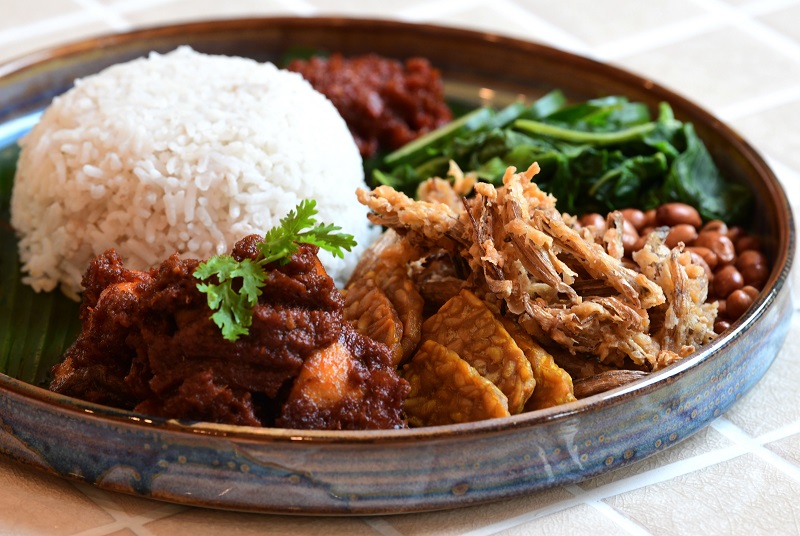
Although she faced her fair share of naysayers with The Vegan Place — “Why don’t you just open a steak restaurant?” was a common refrain — an important lesson she learnt from her time with Foodbae was the appeal of vegan food to the urban community of KL. In fact, more people than she expected were eager to get on a plant-based diet — if not full time, at least a few times a week. Hanna reckons her largest bank of customers are those on a flexitarian diet, a portmanteau of “flexible” and “vegetarian”, signifying its followers’ less strict diet pattern compared with full-time veganism and vegetarianism.
“People know the disadvantages of eating so much meat, they know too much is bad for their health and detrimental to the environment. Even outside of KL, because of the recent flooding, people understand the effects of global warming — you would be surprised how many can connect that to eliminating animal products from their diet,” she shares. “The vegan scene in KL is small but diverse; you have Malaysians from across the board eager to go down this road.”
It is still early days for The Vegan Place, but Hanna hopes to expound the sustainable values of a plant-based diet with a small retail section selling reusable bags and coffee cups, as well as a selection of zero-waste products.
She says: “Veganism is a lifestyle, one that promotes a healthier planet for us to live on. While I can’t say I am fully vegan yet, as I eat seafood on rare occasions when I don’t have a choice, I’d like to help anyone embarking on this journey by making it easier to find pure plant-based foods and make a difference to their lives, and that of the planet.”
Aisya Jabaruddin’s mum is a great chef and taught her a lot about eating and cooking well, but when it came to making a meat-free rendang for her vegan daughter, she couldn’t quite nail down the recipe when she replaced beef with tofu. “It would be watery because she didn’t press enough water out of the tofu. The taste was great, but the texture was not working and I was tired of being the one stuck with less-than-perfect rendang every year. So, in 2016, I started making it on my own and went from using tofu to mushrooms,” Aisya begins.
An early adopter of the plant-based diet, she had no plans to sell her rendang — in the early days, she simply made a little bit extra to share with friends and family. Once news got out and people started placing orders, she upped her quantity — the effort that went into a batch, regardless of how large, was about the same. It remained a seasonal Aidilfitri offering until June 2020, when the pandemic dealt a blow to her employment status — Aisya chose to resign from her job and, based on the popularity of her rendang, started making it all year round for sale. It was wildly popular, and a cleverly chosen name put paid to queries on what the product was made of — Mushroom Lah.
aisya_akmal_4.jpg

Aisya runs the company with her husband, Akmal Hakim Ali, who is also vegan. “I have always been sensitive to the plight of animals, so I chose to go vegan some years ago,” she says. “Akmal was already vegan when we met, although his reasoning is related to global hunger — the sustainable nature of a vegan diet contributes to ending world hunger. Entrepreneurship happened to us by accident, but it’s been a great way to share with others this journey we’re on.”
On mushroomlah.com you can shop for lemang, fresh rendang (we dare you to keep it for more than two meals) and a packaged version that can be shipped nationwide. “We want to be able to make more of the packaged version so we can expand outside of the Klang Valley,” Aisya says. The bulk of her customers at present are non-Malay, who jump at the chance to sample this dish, usually prepared only during festive seasons, especially a version that is meat-free. “When Malay customers purchase my rendang, I am scared, because I wonder whether their family recipe is better than mine,” she laughs.
So far, that has not been a problem, as Aisya has been receiving steady demand for her mushroom rendang — she now makes 70kg a week — for direct purchase or to be sold at restaurants, and has even been courting orders for events and catering. Collaborations are a recent thing that she and Akmal have started venturing into, with a packet of Mushroom Lah rendang accompanying an order of croissants from vegan bakery VickedGood.
mushroom_lah_rendang_with_rice.jpg
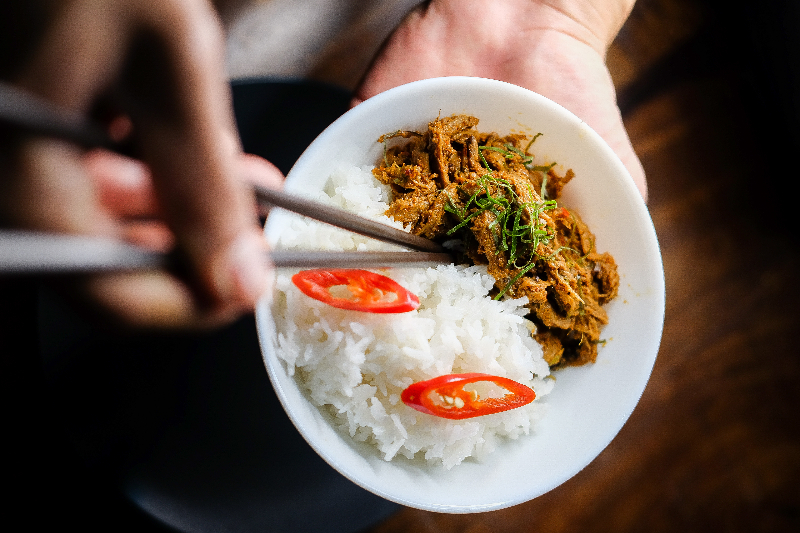
Having mastered the art of mushroom rendang, Aisya and Akmal plan to expand into other vegan dishes such as belado and sambal, as well as onion- and garlic-free versions of their rendang. “We have talked about doing this full time but, while demand for vegan fare has increased, particularly Malay vegan food, we are being cautiously optimistic,” says the digital marketer. “For now, our plan is to expand our product offering and see how well that does before we make a decision.”
Apart from Mushroom Lah, Aisya has channelled her passion for meat-free meals into an Instagram account, where she shares a variety of recipes and videos. While most of the dishes are Asian, she also showcases fusion dishes such as Masala Mac and Cheese, and Western favourites such as Vegan French Toast and fluffy breakfast pancakes.
“Vegan food has a bad reputation of being bland, which is not true — it’s all about how you cook it. It’s also not expensive, which is another misconception. Imported vegan products aren’t cheap, but we have so much fresh produce in Malaysia and that gives us so much variety to go vegan. I am passionate about being vegan and my goal is to share that, and hopefully inspire others too.”
After putting in punishing hours at a wellness company and, later, a business development consultancy, Ahmad Syafik Jaafar decided that being an entrepreneur was his calling — he looked forward to being his own boss, keeping his own hours and doing things his way. At the time, he and his wife, Amirah Mohd Noh, had been researching a healthier diet for their family and discovered how well suited a plant-based diet would be. A lack of vegan food options in the market — whether at restaurants or to cook at home — meant his journey as a plant-based food entrepreneur was all but a foregone conclusion. Nanka was born in 2019, to provide Malaysians with vegan food products made from young jackfruit, which inspired its self-explanatory name.
“My wife and I are major foodies and we love the idea of eating well. But being so busy with our respective careers, the guilt of quick, easy and not-always-healthy meals got to us and we wanted to know what options existed for us. Our goal is really food that is tasty and beneficial to health, and based on our research, a plant-based lifestyle was the perfect solution,” says the long-haired Syafik. “Entrepreneurship is a lifelong dream for me and I was ready for a hands-on, product-driven enterprise. It was an easy decision to marry this to our passion for plant-based eating.”
20220323_peo_nanka_12_lyy.jpg
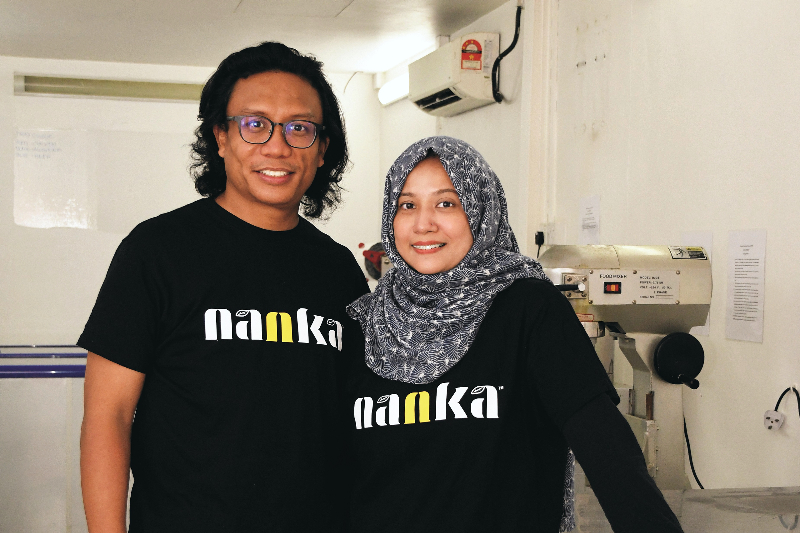
Nanka started out with a product easy enough for consumers to adapt to: burger patties. Initially, the patties included chicken and beef mixed with jackfruit because “the plan then was to promote the idea of a healthier lifestyle and more sustainable, planet-friendly food sources,” Syafik says. “But, eventually, the all-jackfruit patties were most popular. So, we phased out the other products and focused on being a fully plant-based company.”
Having researched peas, chickpeas, mushrooms and even insect-based proteins — his goal at the time was a more sustainable food company, not necessarily plant-based yet, he reminds us as we balk slightly. It was jackfruit that finally won out because of its texture, which most resembles meat, and its myriad health benefits. Rich in vitamin C and one of the few fruits high in B vitamins, jackfruit also contains folate, niacin, riboflavin, potassium and magnesium. Carotenoids, the pigments that give jackfruit its yellow colour, are high in vitamin A, and protect cells from damage and can prevent cancer and heart disease, as well as eye problems such as cataract and macular degeneration. It is also high in fibre and, when eaten raw, contains very little sugar.
At present, Nanka sells two jackfruit-based products — burger patties and an incredibly tender rendang — and has a number of other products in the works with applications in Malay food. This includes cubes ideal for lontong, sausages and shredded jackfruit that could work for use in serunding. As part of Nanka’s commitment to sustainability, the bulk of the jackfruit used in its products comes from a certified ethically run farm in Rawang, Selangor — fewer carbon credits spent, too — and, should supply run short, also from a small, family-owned farm in Kuantan.
20220323_peo_nanka_1_lyy.jpg
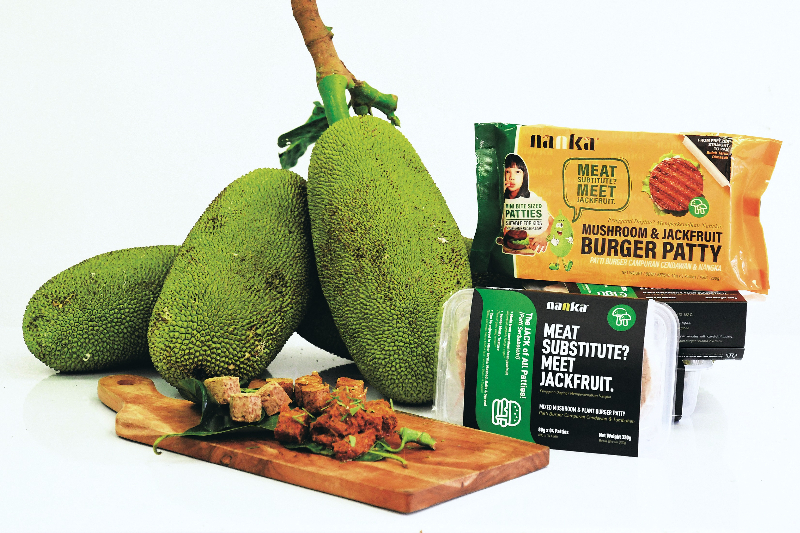
The future looks bright for Nanka, but Syafik remains quite grounded about it all. “We were recently approached by a company that owns a large-scale jackfruit farm and wanted to make a substantial contribution to our company so we would be part of its larger investment portfolio. Interesting offer, but we are mulling it over, as we have lots of plans of our own,” he says. “I am looking beyond jackfruit to maybe developing butter fruit, which is grown in Sabah. And, recently, we received a grant from the Good Food Institute to work on plant-based fats.”
As is the case with any enterprise, Syafik and Amira face many challenges — in manufacturing, marketing and retail, among others — but this has done little to dampen their spirits or discourage them from their vision of making plant-based foods more accessible to a wider audience.
“We have to start by using the phrase “vegan” less,” Syafik says. “That tends to put people off because it locks out certain people — being vegan is not a cult! We feel that the term ‘plant-based’ is better, as it is more inclusive and less limiting. You can opt for a few plant-based meals a week, do it full-time or apply it to your daily life in whatever way you can — any amount makes a difference, and only when everyone feels included, and not locked out of this exclusive club, can the plant-based lifestyle be more prevalent.”
This article first appeared on Apr 4, 2022 in The Edge Malaysia.


